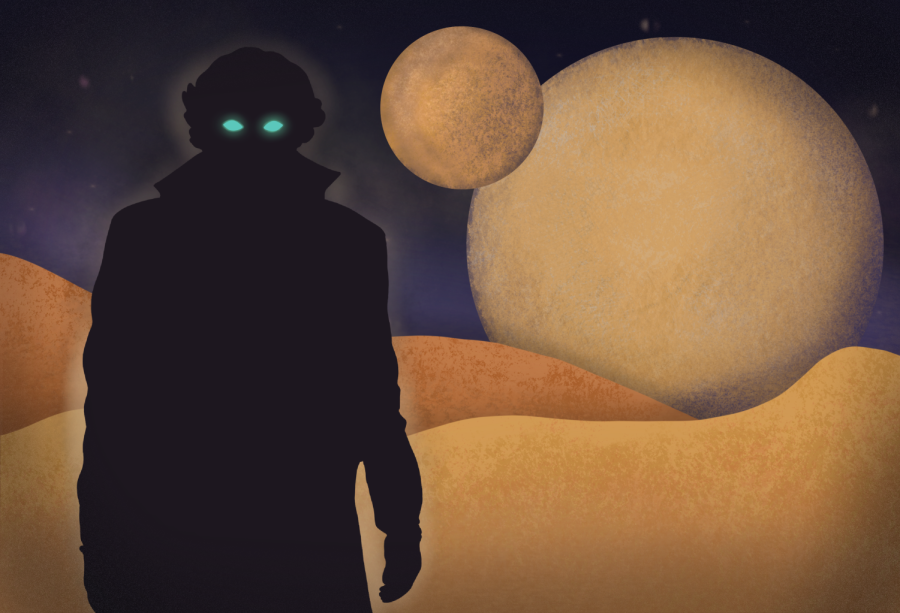Science Fiction like It’s 1965: “Dune” Well Received In Theatres and Online
After multiple attempts and pandemic delays, the latest film adaptation of Frank Herbert’s epic science fiction novel has arrived. With a star studded cast and one of today’s best filmmakers at its helm, “Dune,” directed by Denis Villeneuve, is now in theaters and available to stream on HBO Max.
“Dune” tells the story of Paul Atriedes and his noble house’s struggle to control the desert planet Arrakis. The film stars Timothée Chalamet, Rebecca Ferguson, Oscar Isacc, Josh Brolin, Jason Momoa, Javier Bardem, Stellan Skarsgård, Dave Bautista and Zendaya.
The source material’s thematic focus on religion, politics, ecology, colonization, technology, duty and human connection have been notoriously difficult to adapt to film.
Ben Colby, a second-year history major and “Dune” fan, mentioned that previous attempts, like David Lynch’s 1984 version, struggled to balance dense worldbuilding with weighty thematic elements. He expressed his acclaim for the new adaptation in comparison to the 1984 version.
“I thought it was incredible… I was kind of anxious that they would mess it up again, but I think Denis Villeneuve did a very good job,” Colby said.
The film has been commended for its efficient depiction of Herbert’s notoriously dense worldbuilding. Second-year Biology major Gavin Juviler thought that the film portrayed the fictional well.
“I went in fresh knowing nothing about the lore. By the end I felt like I had a pretty decent understanding of the world,” Juviler said.
The camera carries much of the weight in developing the setting, which Colby praised further.
“I know it’s cliché to talk about the cinematography, but that really was the crown jewel of the film,” Colby said.
Although “Dune” has plenty of CGI, Villeneuve never uses it as a crutch. The set design, costumes, locations, practical effects, score and sound design all fit together to create a cohesive vision of the desert planet.
Arrakis’ ecology, faith system and political tensions are explored thoroughly with minimal exposition. The film explains the world’s rules largely through action and character interaction rather than expositional dialogue, and the breakneck pace in the film replaces the dense prose in the novel.
Warner Brothers released the film in theaters and HBO Max simultaneously. As of Oct. 29th, it has grossed a worldwide total of $241 million, becoming Warner Brothers’ highest grossing project during the pandemic.
Many critics implored audiences to see “Dune” in theaters, but some audience members, like second-year Nursing student Sawyer Laine, preferred to watch it via HBO Max.
“I was very excited to see it, and it was cool to watch and not have to plan a whole thing around [the film] and spend a bunch of money. It was very convenient,” Laine said.
Though marketed as a standalone story, “Dune” is the first part of a series.
Lily Grant, a second-year biochemistry major, expressed her disappointment about the movie being only the first part of the story.
“I liked the movie, but I felt like there was a lot of build up for not a lot of pay off. I get that it was part of something more, but I feel like it should have a beginning, middle and end,” Grant said.
Laine shared a similar outlook.
“I kind of wanted more, but they definitely couldn’t have cut out anything because it was all important to the plot. I think the second part will be very good,” Laine said.
Once considered an unfilmable story due to its scale, “Dune” (2021) has impressed general audiences, critics and fans of the series. Recently, “Dune Messiah,” the second film in the franchise was green-lit which will apparently tie up some of the loose ends from the first film. In some ways, maybe due to years of speculation and hype, it feels like the first proper blockbuster since the beginning of the pandemic, and the start of a new franchise with broad mainstream appeal.


